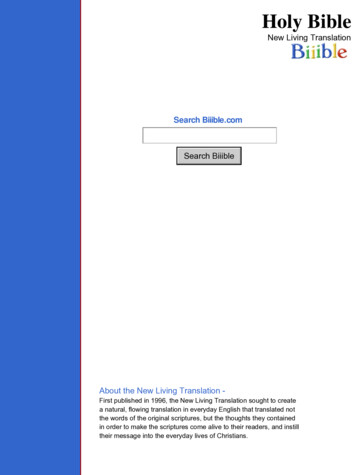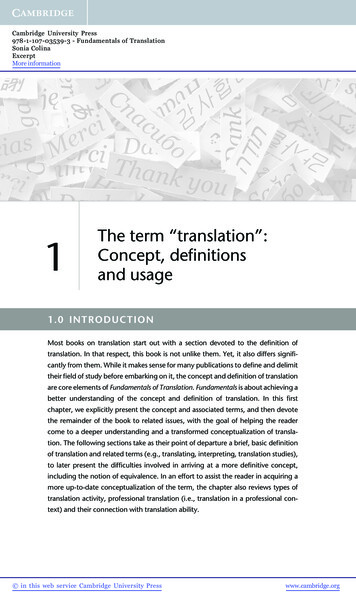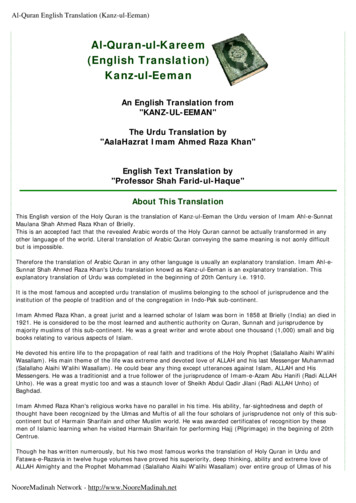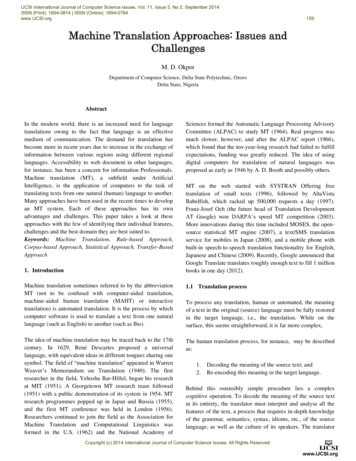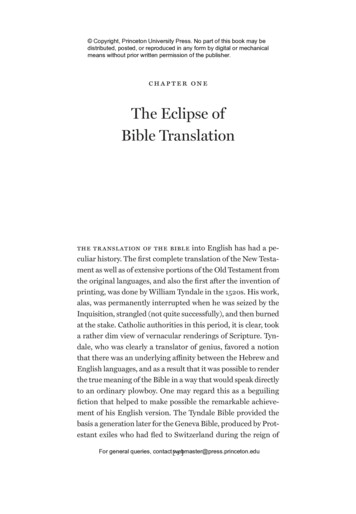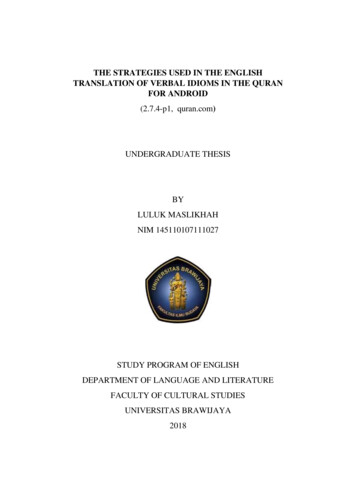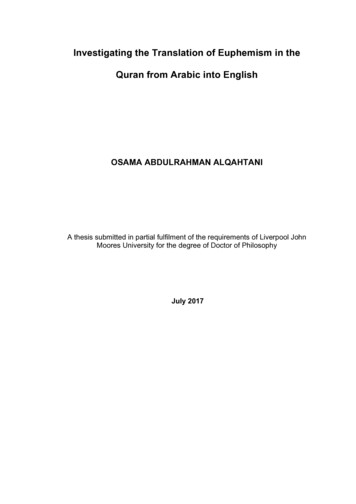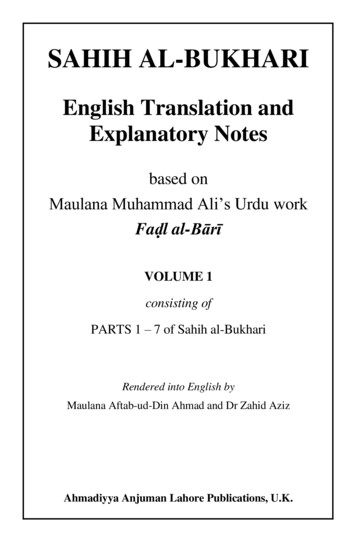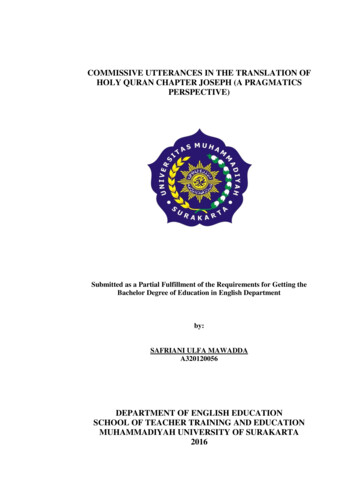
Transcription
COMMISSIVE UTTERANCES IN THE TRANSLATION OFHOLY QURAN CHAPTER JOSEPH (A PRAGMATICSPERSPECTIVE)Submitted as a Partial Fulfillment of the Requirements for Getting theBachelor Degree of Education in English Departmentby:SAFRIANI ULFA MAWADDAA320120056DEPARTMENT OF ENGLISH EDUCATIONSCHOOL OF TEACHER TRAINING AND EDUCATIONMUHAMMADIYAH UNIVERSITY OF SURAKARTA2016
COMMISSIVE UTTERANCES IN THE TRANSLATION OF HOLY QURANCHAPTER JOSEPH (A PRAGMATIC PERSPECTIVE)ABSTRAKPenelitian ini bertujuan untuk 1) menemukan jenis ucapan komisif dalam kitabsuci al-quran dari surah Yusuf dan 2) menggambarkan strategi dalampengucapan kalimat kesopanan dari kalimat komisif dalam kitab suci al-qurandari surah Yusuf. Jenis penelitian ini adalah deskripsi kualitatif. Sumber dataadalah ucapan komisif dalam kitab suci al-quran surah Yusuf.penulismenggunakan dokumentasi dengan membaca isi dari kitab suci al-quran surahYusuf. Jenis strategi kesopanan menggunakan theori Brown dan Levinson. Adaenam jenis dari ucapan komisif yang digunakan, yaitu: menjanjikan,peringatan, menolak, mengancam, sukarela dan menawarkan.Kemudian,peneliti menemukan empat jenis strategi kesopanan, ada Bald on record,kesopanan positif, kesopanan negative dan strategi bald off record.Kata kunci : tuturan komisif, niat, strategi kesantunanABSTRACTThis research is aiming at to 1) finding the types of commissive utterances inHoly Quran chapter Joseph 2) describing the politeness strategies ofcommissive utterances in Holy Quran chapter Joseph. This is a descriptivequalitative research. The data source is commissive utterances in holy Quranchapter Joseph.,the writer uses documentation by reading about the content ofEnglish translation chapter Joseph. Then the writer classifies the data basedon Searle classification. Whilst the politeness strategies, based on theory ofBrown and Levinson. There are six types of commissive utterances used :promising, warning, threatening, volunteering, refusing and offering.Then, theresearcher found four kinds of politeness strategies, there are bald on record,Positive politeness, negative politeness and bald off record.Keywords: commissive utterances, types, politeness strategies1. INTRODUCTIONCommunication as a medium for interaction among humans, or even withother creatures, and of course that has a very important role for human life,especially with his role as a social creature. Basically, good communication,should be guided by the desire to do good. Every human being in this world hasto communicate to each other to fulfill his or her own needs. In reaching the goalof communication, at least, there will be two parties; they are speaker and hearer.1
A successful communication only can be reached if both of the speakerand the hearer are able to convey and understand thoughts, feelings, and desiresof each other.In communication, people usually speak about anything, whetherabout past, present, even future actions. For example, speaker says aboutsomething that caused the hearer wants or not to do something in the future. Alsothere is a moment when the hearer doesn’t believe in the speaker’s words, andthen the speaker commits his/herself to make the hearer believes with him words.Therefore, people use commissive utterances in their communication to showtheir acts in the future.One of speech act commonly used is commissive utterance, that is one ofthe utterances that are often produced in human communication. There are somekinds of utterance that are categorized in commissive utterance. They arewarning, threatening, promissing, refussing, volunteering and offerringutterances.In this research, the writer intends to analyze the secret in Islamic HolyQuran, especially in chapter Joseph. Chapter Joseph is division of Holy Quranwhich consists of 111 verses. This Chapter Talk about the story of ProphetJoseph Peace be upon him. The writer focuses on commissive utterances. Somephenomenon dealing with commissive utterances is found by the writer inEnglish translation of chapter Joseph. For example:Joseph said to his father: „Father, I saw in a dream eleven stars, as wellas the sun and the moon; I saw them prostrate themselves before me.‟(Joseph: 4)My son,‟ he replied, „do not relate your vision to your brothers, lest theyplot some evil against you. Satan is indeed man’s open enemy(Joseph: 5)Through the verse 5 of Joseph above, the utterance shows Warning. Theutterances do not relate your vision to your brothers belongs to commissiveutterance. It means that the father of Joseph gives Warning to Joseph not to relatehis dream to his brothers. The types of commissive in this verse is Warning.Bald on record is the politeness strategy which is used of this utterance. The2
statement is directly addressed to the other as expressing the speakers commandthe speaker uses.Another example of commissive utterance is shown in the following verse:The King said: „Bring this man before me.‟ But when the [King‟s] envoycame to him, Joseph said: ‘Go back to your lord and ask him about thewomen who cut their hands. My Lord has full knowledge of theirguile.‟(Joseph 50)The utterance Go back to your lord and ask him about the women whocut their hands belongs to refusing. Joseph refuses the king’s order tocome to the kingdom before the king asks the woman of the Egypt whocut their hands. The politeness strategy which is used in this verse isnegative politeness.From the simple example above it is clear that a lot of meanings shouldbe understood by the reader of Islamic Holy Quran. Basically Islamic HolyQuran consists of knowledge and law. It is important for the reader to understandthe types of commissive which is given by the speaker. To understand the typesof the commissive is not easy. The writer is greatly interested in doing herresearch dealing with identificationthe types of commissive utterances and thepoliteness strategy in English translation of Islamic Holy Quran chapter Joseph.The writer formulates focus of this study about “Commissive Utterancesin the translation of Holy Quran Chapter Joseph (A pragmatic Perspective)”, thenthe focus is broken down into the types of commissive utterances and thepoliteness strategies of Commissive Utterances in the translation of Holy QuranChapter Joseph. The writer wants to find the types of Commissive Utterances anddescribe the politeness strategies of Commissive Utterances in the translation ofHoly Quran Chapter Joseph.The reason why this research becomes important is that the result willenrich the theories of pragmatics in research of commissive utterances in thetranslation of Holy quran Chapter Joseph. The practical benefit of this researchare become a reference for teachers in teaching commissive act to students.While for theoretical benefit, this research to enrich knowledge and experience ofother researchers who are engrossed in analyzing commissive utterance.3
2. RESEARCH METHODThe type of the research is descriptive qualitative. According to BogandTaylor (Moleong, 2000: 3)“Qualitative method is a research procedure thatresults in descriptive data, either in written and oral form of people or otherbehavior thatcan be studied.”writer used descriptive qualitative methodbecause she analyzed the data and thendescribe the finding to answer the researchquestion. The object of the study iscommissive utterances found in the translationof Holy Quran Chapter Joseph. The data of this study is verses in the Holy Qurancontainingcommissive utterances. In collecting data, the writer usesdocumentation to collectthe data then coding the commissive utterances. The fullsteps in collecting data asfollows: 1) Finding the book of English translation inthe Holy Quran Chapter Joseph based of TafsirFizilalil Quran by Said Quthb, 2)Reading English translation in the Holy Quran Chapter Joseph based ofTafsirFizilalil Quran by Said Quthb, 3) signing the commissive utterances ofEnglish translation of Islamic Holy Quran Chapter Joseph, 4) coding thecommissive utterances of English translation of Islamic Holy Quran ChapterJoseph. In analyzing data, the writer takes these following step : 1) describing thetypes of commissive utterance by referring to the theory of Searle (1979),2)describing the politeness strategies of commissive utterances in Englishtranslation of Islamic Holy Quran Chapter Josephby referring to the theory ofBrown and Levinson (1987)3. FINDING AND DISCUSSIONThe writer finds and discusses the result of the research finding as followTable 4.1 the Types of Commissive UtterancesNo1TypesPromisingExample of Data“Send him with us tomorrow, that hemay enjoy himself and play. We willcertainly take good care of him.”(Joseph 12).“They said: „We shall endeavor to4Numberof Verses6Percentage(%)24%
2Warning3Refusing4Threatening5Volunteeringpersuade his father to let him come.Wewill make sure to do so.”‟ (Joseph 61).“My son,‟ he replied, „do not relateyour dream to your brothers, lest theyplot some evil against you. Satan isindeed man‟s open enemy. (Joseph 5)”And when they went away with him, theyresolved to cast him into the depth of thewell. We revealed [this] to him: „Youwill tell them of this their deed at a timewhen they shall not know you.‟(Joseph15)She in whose house he was living triedto seduce him. She bolted the doors andsaid, ‘Come.’ He said: ‘God protect me.Goodly has my master made my stayhere. Those who do wrong come to nogood.‟ (23)The King said: ‘Bring this man beforeme.’ But when the [King’s] envoy cameto him, Joseph said: ‘Go back to yourlord and ask him about the women whocut their hands. My Lord has fullknowledge of their guile.‟(50)“Said she, this is he on whose accountyou have been me! Indeed I have tried toseduce him, but he guarded his chastity.Now, however, if he does not do what Ibid him, he shall certainly be thrown inprison,andshallindeedbehumiliated.” (Joseph32)And when he had given them theirprovisions, he said: „Bring me thatbrother of yours from your father‟s side.Do you not see that I give just measureand that I am the best of hosts?But ifyou do not bring him, you shall neveragain receive from me a singlemeasure [of provisions], nor shall youcome near me.‟ (Joseph59-60)“[Joseph] said: „My Lord, I wouldsooner be put in prison than complywith what they are inviting me to do.Unless you turn away their guile fromme, I may yield to them and lapse intofolly.” (Joseph33)5728%416%312%14%
6Offering“Kill Joseph, or cast him away in somefaraway land, so that you have yourfather‟s attention turned to you alone.After that you will [repent and] berighteous people.‟ (Joseph9 )One of them said: „Do not kill Joseph,but rather — if you must do something— cast him into the dark depths of thiswell. Some caravan may pick him up.’(Joseph10)TOTAL416%25100%Based on the table 4.1 above, the writer found six Types of commissiveutterances in the English translation Chapter Joseph based on Searle’classification of commissive utterance. There are promising, warning, refusing,threatening, volunteering and offering. As the result, the researcher found 6verses of promising (24%), 7 verses of warning (28%), 4 verses of refusing(16%), 2 verses threatening (12%), 1 verses of volunteering (4%) and 4 verses ofoffering (16%). The number of verses which is used by the writer is 25 verses ofEnglish translation Chapter Joseph. The majority of the types of commissiveutterances that the writer found in English translation of Chapter Joseph isWarning (28%).No1Table 4.2 The Politeness Strategy of Commissive UtterancesPolitenessExample of DataNumberStrategyof versesBald on“Send him with us tomorrow, that16Recordhe may enjoy himself and play. Wewill certainly take good care ofhim.” (Joseph12).“When they opened their camelpacks, they discovered that theirmerchandise had been returned tothem. „Father,‟ they said, „whatmore could we desire? Here is ourmerchandise: it has been returnedto us. We will buy provisions forour people, and we will take goodcare of our brother. We will receivean extra camel-load: that should bean easy load.” (Joseph65).6Percentage(%)64%
2PositivePoliteness“„We have lost the King‟s goblet,‟they answered. „Whoever brings itshall have a camel-load [of grainas a reward].I pledge my word forit.‟(Joseph72)520%312%14%25100%At that point, the man who had beenreleased from prison suddenlyremembered [Joseph] after all thattime and said: ‘I will tell you thereal meaning of this dream, so giveme leave to go.‟ (Joseph45)3NegativePoliteness4Bald offrecordThe King said: „Bring this manbefore me.‟ But when the [King‟s]envoy came to him, Joseph said:‘Go back to your lord and ask himabout the women who cut theirhands. My Lord has full knowledgeof their guile.‟(50) “[Joseph] said:„My Lord, I would sooner be put inprison thancomply with what they are invitingme to do. Unless you turn awaytheir guile from me, I may yield tothem and lapse into folly.”(Joseph33)When they returned to their father,they said: „Father, any [further]grain is henceforth denied us.Therefore, send our brother with usso that we may obtain our fullmeasure [of grain]. We will takegood care of him.‟ (63) He replied:„Am I to trust you with him in thesame way as I trusted you with hisbrother in the past? But God is thebest of guardians; and of all thosewho show mercy He is the MostMerciful.‟ (Joseph64)TOTALBased on the table 4.2 above, the writer found four kinds of the politenessstrategy of commisisve utterances in the English translation of Holy QuranChapter Joseph. There are bald on record, positive politeness, negative politeness7
and Bald off-record strategies. The writer found 16 verses using bald on recordstrategy (64%), 5 verses using positive politeness (20%), 3 verse using negativepoliteness (12%) and 1 verses using off-record indirect strategies (4%). Themajority of politeness strategies that the writer found is bald on record (64%).4. CONCLUSIONBased on the data analysis, the writer finds several conclusions. The writerfind out six types of commissive utterances in the English translation of HolyQuran Chapter Joseph based on Searle’ classification of commissive utterance.There are promising, warning, refusing, threatening, volunteering and offering.As the result, the writer found 6 verses of promising (24%), 7 verses of warning(28%), 4 verses of refusing (16%), 2 verses threatening (12%), and 1verse ofvolunteering (4%) and 4 verses of offering (16%). The majority of the intentionof commissive utterances that the writer found in English translation of ChapterJoseph is Warning (28%).Based on the data analysis, the writer found four kinds of the politenessstrategy of commisisve utterances in the English translation of Holy QuranChapter Joseph. There are bald on record, positive politeness, negative politenessand Bald off-record strategies. The writer found 16 verses using bald on recordstrategy (64%), 5 verses using positive politeness (20%), 3 verse using negativepoliteness (12%) and 1 verse using off-record indirect strategies (4%). Themajority of politeness strategies that the writerfound is bald on record (64%).DedicationThis research paper is wholly dedicated to the greatest ones Allah SWT,herbeloved mom, dad, sisters and friends.BIBLIOGRAPHYAbuya. (2012) “A Pragma-stylistic Analysis of President Goodluck Ebele JonathanInauguralSpeech”.English Language. Teaching vol. 5 no 11, 2012.Published by Canadian Center of Science. Accessed on 16th July 2016 (http://web.ccsenet.org )8
Ad-Darraji, Foo et. Al. (2012). “Offering as a Commissive and directive SpeechAct: Consequence for Cross-Cultural International Journal of ScientificandResearch publications vol 2.Accessed on 19th juni 2016(http//www.ijsrp.org)Ahidjo U. Embugushiki, (2010). “Doing Things with Words: A Speech ActAnalysis of a Christian Wedding” An international Multi-DiciplinaryJournal, Ethiopia Vol 4. Accessed on 19 th juni 2016Brown, Penelope and Stephen C.(1987) Levinson. Politeness: some universal inlanguage Usage Cambridge: Cambridge University Press.Bousfield, D.(2008). Impoliteness in Interaction. Philadelphia: John BenyaminsPublishing Company.Fauziati, Endang. (2009). Readings on Applied Linguistics: A Handbook forLanguage Teacher and Teacher Reasercher. Surakarta: Era Pustaka Utama.Historiana, Dian Aulia (2016). Commissive Utterances in the Translation ofIslamic holy Scipture Chapter Ash-shu‟ara.Surakarta: MuhammadiyahUniversity of Surakarta.Kreidler, Charles. W. (1998).Introducing English Semantics.London :RoutladgeLeech GN (1983) Principles of pragmatics. London: Longman Publishing Group.Levinson, C Stephen. (1983). Pragmatics. United Kingdom: Cambridge UniversityPress.Levinson, C Stephen. (2000). Pragmatics. United Kingdom: Cambridge UniversityPress.Mahmud, F. Rahman and Zen E.N. Laily (2015).”Illocutionary speech acts of theOats Utterances employed in Translation of the Noble Quran, Malang :State University of Malang.Nouzard, Laila and Jabbari, M. Jafar (2015). “A Cross-Linguistic Analysis ofEnglish-Persian Comissives and Directives in of mice and men”Internasional Journal of English and education volume:4. Accessed on 19thjuni 2016Nunan, David. (1993). Introducing DiscourseAnalysis. United State of America(USA): Penguin Book.Prastuti.Rizqi Arum (2015). An analysis of Commissive Utterances in the filmEntitled “the Gods must be crazy. Surakarta. SebelasMaret UniversitySurakarta.9
Rahmawati, Sovia (2012). Commissive Utterances in Toy Story Movie Manuscript.Surakarta: Muhammadiyah University of SurakartaRenaldo, Gaspie. (2014). Politeness Strategies in Disagreement Used by EnglishDepartment Students of Muhammadiyah University of Surakarta:Surakarta. Unpublished Thesis.Muhammadiyah University of Surakarta.Sari,Rizka Kurnia (2012).Sociopragmatic analysis on commissive utterances onPlatoon movie and its Subtitle. Surakarta: Muhammadiyah University ofSurakarta.Searle .J.R (1979) Expression and Meaning. Cambridge: Cambridge UniversitypressSundari,Dewi(2009). A Pragmatic Analysis on Commissive Utterances inAristocraticMovie Manuscript. Surakarta: Muhammadiyah University ofSurakarta.Peccei, Jean Stilwell. (1999). Pragmatics. USA and Canada: Routledge.Watts, R. J. (2003).Politeness. Cambridge: Cambridge University Press.Yule, George. (2006). The Study of Language. New York: Cambridge UniversityPress.Yule, George. (1996). Pragmatics. Oxford: Oxford University Press.10
Holy Quran chapter Joseph 2) describing the politeness strategies of commissive utterances in Holy Quran chapter Joseph. This is a descriptive qualitative research. The data source is commissive utterances in holy Quran chapter Joseph.,the writer uses documentation by reading about the content of English translation chapter Joseph.


